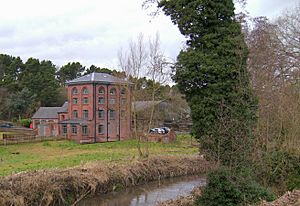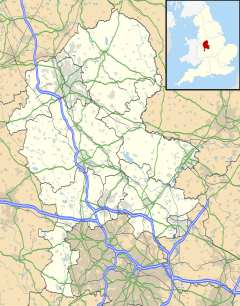Greensforge facts for kids
Quick facts for kids Greensforge |
|
|---|---|
| OS grid reference | SO861888 |
| District |
|
| Shire county | |
| Region | |
| Country | England |
| Sovereign state | United Kingdom |
| Post town | Kingswinford, Dudley |
| Postcode district | DY6 |
| Police | Staffordshire |
| Fire | Staffordshire |
| Ambulance | West Midlands |
| EU Parliament | West Midlands |
| UK Parliament |
|

Greensforge is a small village area in South Staffordshire, England. It's located near the towns of Kinver and Swindon. Greensforge is famous for its connections to ancient Roman times and its history of factories and workshops.
Contents
What's in a Name? The Story of Greensforge
The name Greensforge comes from a type of workshop called a "forge." This forge was set up here in the early 1600s. People called it "Mr. Green's Forge."
Forges were common along the Smestow Brook. They used water from the brook to power their machines. They also used charcoal to heat metals. These early workshops helped make tools and other metal items.
A Look Back: Greensforge Through Time
Greensforge wasn't the first settlement in this area. Long before the forge, the Romans were here.
Roman Forts: Ancient Army Camps
The Romans built several forts near Greensforge. These forts were on the west side of the Smestow Brook. One fort was quite large, about 2.3 hectares (that's like 5.7 football fields!). You can still see its low walls today. This fort was used around 60-80 AD. People found many Roman pots and other items here.
Another Roman site was found using aerial photos. This one was built even earlier, during the time of Emperor Claudius. It was built to use the nearby brooks for defense. The Romans also had temporary camps in the area.
From Mill to Modern Homes: The Forge's Journey
The famous forge replaced an older mill on the Smestow Brook. This land was once part of Kinver Forest. Medieval settlers had cleared parts of the forest for farming.
The forge might have been used by Dud Dudley, a famous iron-maker. In the 1680s, the forge changed. It became a "blade mill" for sharpening tools like scythes. Later, in the 1800s, it was rebuilt as a corn mill. This mill ground grain into flour. In 2008, the old mill building was turned into apartments.
The Staffordshire and Worcestershire Canal
Around 1770, a new waterway was built through Greensforge. This was the Staffordshire and Worcestershire Canal. It was designed by James Brindley. The canal opened in May 1772.
A brick bridge was built over the canal. There was also a wharf (a place for boats to load and unload). Locks were built to help boats move up and down the canal. These parts of the canal are still there today. They are next to the old mill and the river.


